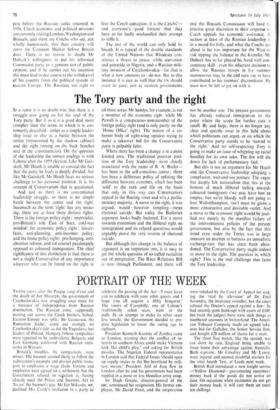The Tory party and the right
In a sense it is no doubt true that there is a struggle now going on for the soul of the Tory party. But if so it is a good deal more complex than the terms in which it is cus- tomarily described—either as a simple leader- ship issue or else as a battle between the centre (represented by the shadow cabinet) and the right (strong on the back benches and in the constituencies). On the question of the leadership the correct analogy is with Labour after the 1959 election. Like Mr Gait- skell, Mr Heath is unable to conceal the fact that the party he leads is deeply divided; but like Mr Gaitskell, Mr Heath faces no serious challenge to his personal position. It is his concept of Conservatism that is questioned.
And just as there is no conventional leadership struggle, so there is no simple battle between the centre and the right. Inasmuch as the term `right' has any mean- ing, there are at least three distinct rights. There is the foreign policy right : imperialist, pro-Britain's role East of, Suez, cold-war minded; the economic policy right: laisser- faire, anti-planning, anti-incomes policy; and the home policy right: pro-hanging, anti- abortion reform, and (of course) passionately opposed to coloured immigration. The chief significance of this distinction is that there is not a single Conservative of any importance whatever who can be found on the right in all three areas. Mr Sandys, for example, is not a member of the economic right while Mr Powell is a conspicuous non-member of the foreign policy right (and is only partly on the `Home Office' right). The notion of a co- herent body of right-wing opinion trying to make a takeover bid for the Conservative party is palpably false.
Where there has been a change is in a more limited area. The traditional postwar posi- tion of the Tory leadership—most closely associated with the name of R. A. Butler— has been in the self-conscious centre: there has been a deliberate policy of splitting the difference between extremes, which has been `sold' to the rank and file on the basis that only in this way can Conservatives appeal to the floating voter and win a parlia- mentary majority. A move to the right, it was argued, would—however tempting—mean electoral suicide. But today the Butlerian argument looks badly battered. For a move towards extremism and the illiberal right on immigration and its related questions would arguably prove the very reverse of electoral suicide.
But although this change in the balance of argument is an important one, it is easy to get the whole question of so-called racialism out of perspective. The Race Relations Bill is now through Parliament, and there will not be another one. The present government has already reduced immigration to the point where the scope for further cuts is small. By and large, there is no longer any clear and specific issue in this field about which politicians can argue, or on which the Conservative party stands to be `moved to the right.' And no self-respecting Tory is going to make an issue of whipping up racial hostility for its own sake. The fire will die down for lack of parliamentary fuel:. H But this is not an argument for Mr Heath and the Conservative leadership adopting a complacent, wait-and-see posture. The ,vague but deeply felt nationalism that lies at the bottom of much illiberal feeling towards coloured immigrants ('we may have lost 'an empire, but we're bloody well not going to lose Wolverhampton, too') must be' given a more constructive and desirable outlet. And a move to the economic right would be justi- fied not merely by the manifest failure of the interventionist policies of the present government, but also by the fact that this trend even under the Tories was in :large measure an attempt to buttress an unrealistic exchange-rate that has since been .aban- doned. The Conservative party ought indeed to move to the right. The question is, which right? This is the real challenge that faces the Tory leadership.






































 Previous page
Previous page